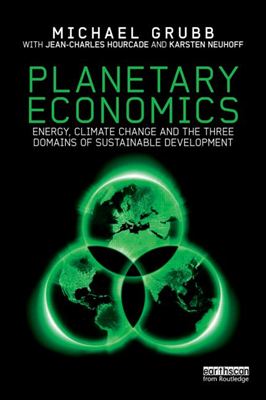Why the mistakes that led to the financial crisis are being transferred to the planet – and what to do about it

Planetary Economics, a new book by Professor Michael Grubb analyses what we have learned from twenty years of efforts to tackle global energy and environmental problems – and what we need to do differently.
Routledge released Planetary Economics, by Professor Michael Grubb with Professors Hourcade and Neuhoff, on March 21, 2014. It sets out the apparent gaps between theory and fact, and between ambition and action, in energy and climate change. From this it analyses why progress has been so difficult and a presents a new framework to explain how the challenges can be tackled more effectively. It maps out three domains of decision-making each of which involves different actors, processes and theoretical foundations, implying three pillars of action. The book links these three domains to current debates about optimality and growth in economic systems, and the lessons from the financial crisis.
The book argues that far from competing, only packages spanning all three pillars are politically credible and stable: together the combination can change our present destructive course, and dissolve the conflict between the economy and the environment, potentially benefiting both in the process.
To arrange interviews with the author, including reactions to the UNFCCC anniversary or European Council decisions, contact Climate Strategies on +44 203 108 5936, or text +44 7841 145735.
About the Authors
Professor Michael Grubb is Chair of Energy and Climate Policy at the Cambridge University Centre for Climate Change Mitigation Research, and Senior Advisor on Sustainable Energy Policy to the UK Energy Regulator Ofgem. He is editor-in-chief of the journal Climate Policy and is on the editorial board of Energy Policy. He was recently the Specialist Advisor to a House of Lords European Committee enquiry. ‘No Country is an Energy Island: securing investment for the EU's Future' (2013). Former positions include Chair of the research organization Climate Strategies; Chief Economist at the Carbon Trust; Professor at Imperial College London; and head of Energy and Environment at Chatham House.
Professor Jean-Charles Hourcade is Research Director at the Centre National de la Recherche Scientifi que and Professor at the École Nationale des Ponts et Chaussées.
Karsten Neuhoff is Department Head at the German Institute for Economic Research (DIW Berlin) and Professor at Technical University Berlin.
Planetary Economics: Energy, climate change and the three domains of sustainable development
By Michael Grubb
With Jean-Charles Hourcade, Karsten Neuhoff
ISBN 978-0-415-51882-6, $67.95, £39.99
Publication date: March 2014
www.routledge.com/u/9780415518826/
Beth Henderson
Marketing - Economics
beth.henderson@taylorandfrancis.com
(212)216-7843
-----------------------------------------
About Taylor & Francis Group
-----------------------------------------
Taylor & Francis Group partners with researchers, scholarly societies, universities and libraries worldwide to bring knowledge to life. As one of the world’s leading publishers of scholarly journals, books, ebooks and reference works our content spans all areas of Humanities, Social Sciences, Behavioural Sciences, Science, and Technology and Medicine.
From our network of offices in Oxford, New York, Philadelphia, Boca Raton, Boston, Melbourne, Singapore, Beijing, Tokyo, Stockholm, New Delhi and Johannesburg, Taylor & Francis staff provide local expertise and support to our editors, societies and authors and tailored, efficient customer service to our library colleagues.
Tags:


